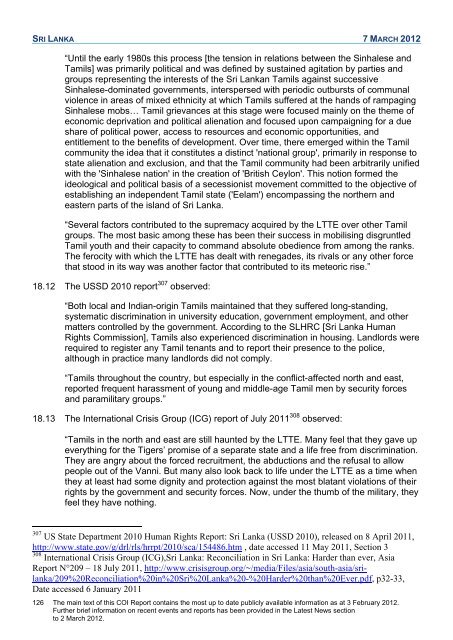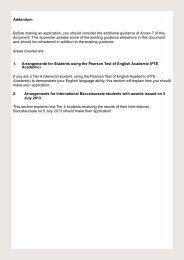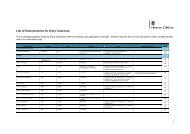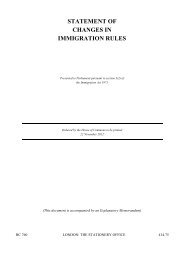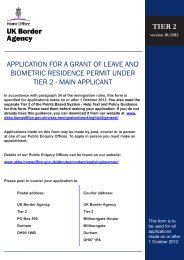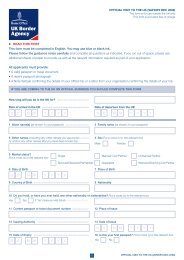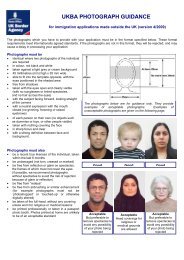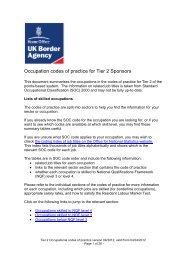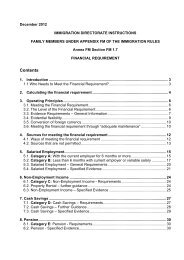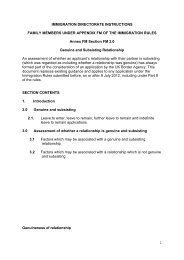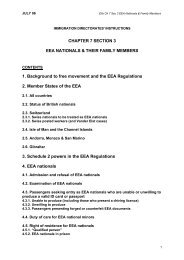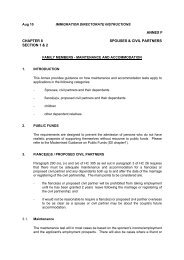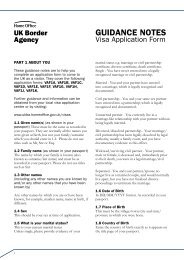COI Report March 2012 - UK Border Agency - Home Office
COI Report March 2012 - UK Border Agency - Home Office
COI Report March 2012 - UK Border Agency - Home Office
Create successful ePaper yourself
Turn your PDF publications into a flip-book with our unique Google optimized e-Paper software.
SRI LANKA 7 MARCH <strong>2012</strong><br />
―Until the early 1980s this process [the tension in relations between the Sinhalese and<br />
Tamils] was primarily political and was defined by sustained agitation by parties and<br />
groups representing the interests of the Sri Lankan Tamils against successive<br />
Sinhalese-dominated governments, interspersed with periodic outbursts of communal<br />
violence in areas of mixed ethnicity at which Tamils suffered at the hands of rampaging<br />
Sinhalese mobs… Tamil grievances at this stage were focused mainly on the theme of<br />
economic deprivation and political alienation and focused upon campaigning for a due<br />
share of political power, access to resources and economic opportunities, and<br />
entitlement to the benefits of development. Over time, there emerged within the Tamil<br />
community the idea that it constitutes a distinct 'national group', primarily in response to<br />
state alienation and exclusion, and that the Tamil community had been arbitrarily unified<br />
with the 'Sinhalese nation' in the creation of 'British Ceylon'. This notion formed the<br />
ideological and political basis of a secessionist movement committed to the objective of<br />
establishing an independent Tamil state ('Eelam') encompassing the northern and<br />
eastern parts of the island of Sri Lanka.<br />
―Several factors contributed to the supremacy acquired by the LTTE over other Tamil<br />
groups. The most basic among these has been their success in mobilising disgruntled<br />
Tamil youth and their capacity to command absolute obedience from among the ranks.<br />
The ferocity with which the LTTE has dealt with renegades, its rivals or any other force<br />
that stood in its way was another factor that contributed to its meteoric rise.‖<br />
18.12 The USSD 2010 report 307 observed:<br />
―Both local and Indian-origin Tamils maintained that they suffered long-standing,<br />
systematic discrimination in university education, government employment, and other<br />
matters controlled by the government. According to the SLHRC [Sri Lanka Human<br />
Rights Commission], Tamils also experienced discrimination in housing. Landlords were<br />
required to register any Tamil tenants and to report their presence to the police,<br />
although in practice many landlords did not comply.<br />
―Tamils throughout the country, but especially in the conflict-affected north and east,<br />
reported frequent harassment of young and middle-age Tamil men by security forces<br />
and paramilitary groups.‖<br />
18.13 The International Crisis Group (ICG) report of July 2011 308 observed:<br />
―Tamils in the north and east are still haunted by the LTTE. Many feel that they gave up<br />
everything for the Tigers‘ promise of a separate state and a life free from discrimination.<br />
They are angry about the forced recruitment, the abductions and the refusal to allow<br />
people out of the Vanni. But many also look back to life under the LTTE as a time when<br />
they at least had some dignity and protection against the most blatant violations of their<br />
rights by the government and security forces. Now, under the thumb of the military, they<br />
feel they have nothing.<br />
307 US State Department 2010 Human Rights <strong>Report</strong>: Sri Lanka (USSD 2010), released on 8 April 2011,<br />
http://www.state.gov/g/drl/rls/hrrpt/2010/sca/154486.htm , date accessed 11 May 2011, Section 3<br />
308 International Crisis Group (ICG),Sri Lanka: Reconciliation in Sri Lanka: Harder than ever, Asia<br />
<strong>Report</strong> N°209 – 18 July 2011, http://www.crisisgroup.org/~/media/Files/asia/south-asia/srilanka/209%20Reconciliation%20in%20Sri%20Lanka%20-%20Harder%20than%20Ever.pdf,<br />
p32-33,<br />
Date accessed 6 January 2011<br />
126 The main text of this <strong>COI</strong> <strong>Report</strong> contains the most up to date publicly available information as at 3 February <strong>2012</strong>.<br />
Further brief information on recent events and reports has been provided in the Latest News section<br />
to 2 <strong>March</strong> <strong>2012</strong>.


